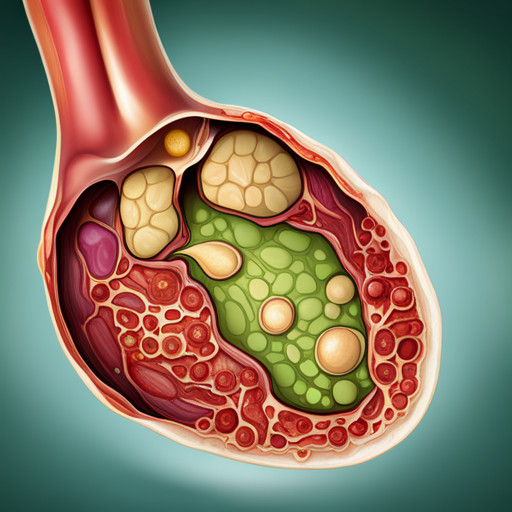Deadly Liver Cancer: Warning Signs Revealed
Liver cancer, the third leading cause of cancer-related deaths globally, is a substantial health concern. This article explores the vital early warning signs of liver cancer, both common and uncommon, and provides insight into the disease's impact on the body. Understanding these symptoms can expedite diagnosis and treatment, significantly improving prognosis. We will also discuss treatment options and preventative measures, emphasizing the importance of regular check-ups and lifestyle adjustments.

Key Takeaways
- Liver cancer is the third leading cause of cancer-related deaths globally.
- Early warning signs of liver cancer include discomfort in the upper abdomen, a hard lump below the rib cage, and jaundice.
- Uncommon symptoms such as pale, chalky bowel movements and persistent fever may indicate liver cancer.
- Regular check-ups and early detection are crucial for successful treatment and improving survival rates.
Understanding Liver Cancer: An Overview
Liver cancer, which is primarily categorized into two types - Hepatocellular carcinoma and bile duct cancer (cholangiocarcinoma), is one of the deadliest diseases globally, with Hepatocellular carcinoma being the third leading cause of cancer-related deaths worldwide. Identifying risk factors is integral to early detection and successful treatment. These include hepatitis B or C infections, chronic liver disease, and certain genetic conditions. Advancements in liver cancer treatment have improved survival rates, with options ranging from surgery to radiation therapy, and innovative treatments like targeted therapy and immunotherapy. However, the complexity and aggressiveness of this disease necessitate continuous research and development in this field. Understanding the nature of liver cancer and its risk factors is the first step towards successful prevention and treatment.
The Role and Importance of The Liver
Undeniably, the liver plays a crucial role in maintaining overall health, and concurrently, it is one of the most susceptible organs to cancerous diseases. The role of the liver in metabolism and detoxification is indispensable. It helps in the processing of nutrients, production of bile for digestion, and removal of harmful substances from the bloodstream. However, the occurrence of liver cancer significantly hampers these functions, thereby affecting the overall health and well-being of an individual. The impact of liver cancer can result in weight loss, fatigue, and other systemic symptoms. Therefore, it is essential to understand the role and importance of the liver, and to be aware of the warning signs of liver cancer for early detection and treatment.
Recognizing the Early Warning Signs of Liver Cancer
In the pursuit of early detection, it's critical to familiarize oneself with the preliminary warning signs of liver cancer. These may include discomfort in the upper abdomen, a hard lump below the rib cage, and jaundice. An individual might also experience unusual tiredness, unexplained weight loss, and a loss of appetite. These symptoms could potentially indicate a liver cancer diagnosis. It's essential to consult with a healthcare provider if any of these signs persist, as early diagnosis can significantly improve liver cancer treatment options. This could range from surgery and radiation to targeted therapy. Recognizing these early warning signs is a crucial step towards proactive health management and combating this deadly disease.
Uncommon Symptoms That May Indicate Liver Cancer
A patient's manifestation of less common symptoms such as pale, chalky bowel movements and persistent fever, may potentially indicate the presence of liver cancer. These symptoms are not exclusive to adults; liver cancer in children can similarly manifest. Children may not express or articulate their discomfort clearly, making these subtler signs crucial for early detection. Moreover, these symptoms should be considered within the context of risk factors for liver cancer. Such factors include chronic viral hepatitis, heavy alcohol consumption, and inherited liver diseases. In children, specific genetic conditions and syndromes may increase the risk. If these symptoms align with any of the risk factors, it is advisable to seek immediate medical attention to rule out liver cancer.
More Subtle Symptoms of Liver Cancer You Should Not Ignore
Recognizing the more subtle symptoms of liver cancer is crucial for early detection and timely treatment. As liver cancer stages progress, symptoms may become more noticeable, however, earlier signs like sudden weight loss, persistent fatigue, and decreased appetite can often be overlooked. These symptoms, although subtle, should not be ignored. Regular check-ups are critical, especially for those with liver cancer risk factors such as chronic viral hepatitis, cirrhosis, or excessive alcohol consumption. Unexplained bruising or bleeding, nausea, and a feeling of fullness after a small meal are other potential indicators. Remember, liver cancer's silent progression makes awareness of these less obvious symptoms vital in combating this deadly disease.
How Liver Cancer Affects the Body
When one is diagnosed with liver cancer, it is essential to understand how this disease significantly impacts the body's overall functionality. The impact on liver function is pronounced, as the organ's ability to filter harmful substances from the blood, store energy, and aid in digestion is compromised. As the disease progresses, these effects on overall health become increasingly apparent. Symptoms might include fatigue, nausea, loss of appetite, and unexplained weight loss. Liver cancer can also lead to jaundice, causing a yellowing of the skin and eyes. Furthermore, the body's ability to clot blood may be diminished, leading to easy bruising or bleeding. It's crucial to recognize these signs early for effective treatment.
Diagnosis of Liver Cancer: What to Expect
Although the symptoms of liver cancer may seem alarming, understanding the diagnostic process can provide some reassurance and clarity for patients, guiding them through what to expect during this critical phase. Common diagnostic tests include imaging studies such as ultrasound, CT scan, and MRI, as well as biopsy procedures to examine suspicious cells. Blood tests can also be conducted to assess liver function and detect cancer markers. The importance of early detection cannot be overstated, as it significantly increases the chances of successful treatment and survival. Therefore, individuals experiencing persistent symptoms are urged to seek medical attention promptly. This proactive approach can potentially lead to a timely diagnosis, enabling patients to embark on their treatment journey at the earliest.
Treatment Options for Liver Cancer
A patient's treatment plan for liver cancer will typically depend on several factors including the type, stage of the cancer, and their overall health condition. Liver cancer treatment options can range from surgical procedures to remove the tumor, liver transplant, targeted therapy, radiation therapy, or immunotherapy. Advances in liver cancer treatment have improved survival rates and quality of life for many patients. These include the development of more effective chemotherapy drugs and techniques for delivering radiation. There's also a growing emphasis on personalized medicine, which tailors treatment to the individual patient's needs and genetic profile. It's essential to discuss with your medical team to understand the pros and cons of each option, and to decide the best course of action.
Preventing Liver Cancer: Lifestyle Adjustments and Regular Check-ups
To significantly reduce your risk of developing liver cancer, it is recommended that you make certain lifestyle adjustments and undergo regular medical check-ups. Preventing liver cancer often involves dietary changes, such as reducing alcohol and processed food consumption, whilst increasing intake of fruits, vegetables and lean proteins. Understanding risk factors, like obesity and diabetes, and implementing prevention strategies, such as regular exercise, also play crucial roles. Vaccinations, particularly against Hepatitis B and C, which are known to increase liver cancer risk, have a potential role in liver cancer prevention. Regular medical check-ups and screenings can detect liver damage early, increasing the chances of successful treatment. By integrating these preventive measures into your lifestyle, you can significantly lower your liver cancer risk.
Frequently Asked Questions
What Are the Risk Factors Associated With Liver Cancer?
Liver cancer risk factors encompass a range of lifestyle and health aspects. Chronic Hepatitis B or C infections can significantly increase the risk of developing liver cancer. Additionally, excessive alcohol consumption over prolonged periods can lead to cirrhosis, another major risk factor for liver cancer. Other factors include obesity, type 2 diabetes, exposure to aflatoxins, and certain inherited liver diseases. It's crucial to manage these factors to lower the risk of liver cancer.
How Is the Prognosis Determined for Liver Cancer Patients?
The prognosis for liver cancer patients is determined by various factors including the stage and size of the cancer, overall health of the patient, and the patient's response to treatment. Surgical options such as liver resection or transplantation may offer potential for cure in early-stage disease. More advanced stages might benefit from systemic therapies like immunotherapy, the efficacy of which depends on individual tumor characteristics. Regular follow-ups are crucial in monitoring treatment response and detecting any recurrence.
How Does Liver Cancer Affect the Day-To-Day Life of the Patient?
Liver cancer significantly impacts a patient's daily life. Dietary changes are often required, as the liver's function is compromised, affecting digestion and nutrient absorption. Patients may experience weight loss, loss of appetite, and dietary intolerance. Emotionally, a diagnosis of liver cancer can lead to stress, anxiety, and depression. The physical discomfort and changes in lifestyle can further contribute to emotional distress. Therefore, psychological support is crucial alongside medical treatment.
Are There Support Groups Available for Individuals Diagnosed With Liver Cancer?
Yes, there are numerous support groups available for individuals diagnosed with liver cancer. These groups provide a platform for sharing experiences and coping strategies, offering emotional support during this challenging time. They are typically facilitated by professionals and can be found both online and in-person. Such groups can significantly aid in managing the psychological impact of the disease, promoting a more positive outlook and improved quality of life for patients.
What Recent Advancements Have Been Made in the Treatment of Liver Cancer?
Recent advancements in liver cancer treatment have been significant. Immunotherapy breakthroughs, such as the use of checkpoint inhibitors, have shown promise in treating this deadly disease. Moreover, advancements in genetic research have led to personalized treatment plans, targeting specific genetic mutations in cancer cells. These innovative treatments offer improved outcomes and quality of life for patients, signifying a positive shift in the fight against liver cancer.
Conclusion
In conclusion, liver cancer is a significant global health issue necessitating prompt diagnosis and treatment. Awareness and understanding of the early warning signs, including abdominal discomfort, jaundice, and unexplained weight loss, are crucial for early intervention. Diagnostic procedures and treatment options vary, but lifestyle adjustments coupled with regular check-ups can aid in prevention. This knowledge can enhance survival rates, emphasizing the importance of public awareness in managing this formidable disease.

This post has been generated by AI and was not reviewed by editors. This is Not legal advice. Please consult with an attorney.




